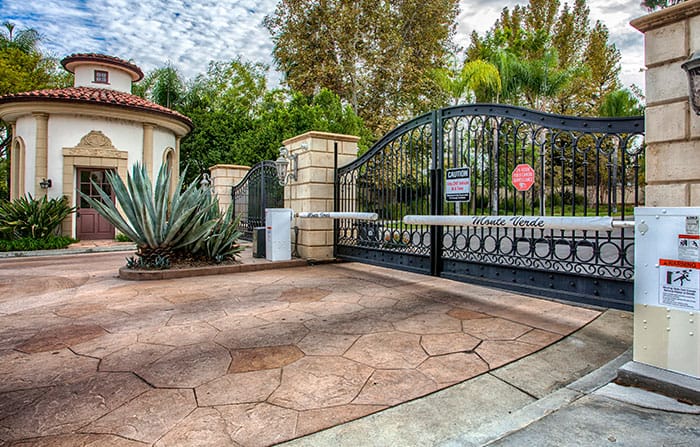[ad_1]
Automatic gates are a popular addition for many homeowners looking to increase security and make their property more convenient to access. However, installing automatic gates on a sloped driveway can be a bit more complicated than on a flat surface. But, can automatic gates be installed on sloped driveways? The answer is yes! In this article, we will discuss the various considerations and options available for installing automatic gates on sloped driveways.
Considerations for Installing Automatic Gates on Sloped Driveways
The first thing to consider when installing automatic gates on a sloped driveway is the degree of incline. The steeper the slope, the more challenging it becomes to install the gate. Automatic gates require a level surface to operate efficiently, and the more irregular the slope, the more complicated the installation process becomes.
Moreover, steep inclines can cause the gates to become unstable and may require additional support such as concrete footings to ensure they operate smoothly. For this reason, it is essential to have a professional installer come out and assess the driveway to determine the optimal solution.
Another consideration when installing automatic gates on sloped driveways is the materials used. Gates can be made from various materials, including wood, wrought iron, and aluminum, and each material has different characteristics that can affect the installation process.
For instance, wooden gates generally require more maintenance and are susceptible to warping or twisting underneath extreme weather conditions. Thus, automated wooden gates may require additional support and reinforcement to function correctly on sloping driveways.
On the other hand, aluminum and wrought iron gates are lightweight and durable, making them ideal for automatic gate installation on sloped driveways. They require less maintenance than wooden gates and are less prone to deformations due to external factors.
Options for Installing Automatic Gates on Sloped Driveways
There are various options available for installing automatic gates on sloped driveways. Each of the following options has its benefits and considerations that should be evaluated before deciding on the best solution for your property.
1. Sliding Gates
Sliding gates are a popular option for sloped driveways as their mechanism allows for them to move back and forth along a track. Sliding gates can be installed on almost any gradient and are a great choice if the driveway has limited space for the gate to open and close.
One factor to consider when choosing sliding gates for a sloped driveway is the track’s slope. The track needs to be installed perfectly level to ensure the gate moves seamlessly. Additionally, sliding gates can be more expensive than other types of automatic gates, depending on the scale, material, and opening mechanism you choose.
2. Cantilever Gates
Cantilever gates are another good option for sloped driveways. They use an extended arm to support the gate rather than a track, which means they do not create as much friction meaning less maintenance. Cantilever gates require a minimal footprint and operate smoothly, making them perfect for properties with limited space.
They also provide an elegant and stylish look to any property with their sleek design. Cantilever gates are often composed of lighter materials that make them easier to install on sloped driveways.
3. Hinged Gates
Hinged gates are a fundamental option for an automated gate, and they are often the most economical compared to sliding or cantilevered gates. These types of doors operate similarly to regular doors, and they can be installed on both flat surfaces and sloping driveways.
However, hinged gates may not be the best choice for steeper gradients due to the possibility of increased friction during the gate’s opening and closing movement. They also require more space to operate efficiently, so they may not be ideal for properties with limited space.
FAQs about Installing Automatic Gates on Sloped Driveways
1. Are automatic gates more expensive to install on sloping driveways than flat surfaces?
Automatic gates are generally more expensive to install on sloping driveways than flat surfaces due to the additional work required to install them. However, the cost varies based on the type of gate, the materials used, and the degree of incline.
2. Can automatic gates be installed on any slope gradient?
Automatic gates can be installed on most inclines, but steeper gradients may require additional structural supports for stability. Professional gate installers can assess the driveway’s slope and recommend the best type of gate to install.
3. Can automatic gates be installed on my existing gate?
The installation of automatic gates on an existing gate depends on the gate’s stability, materials used, and other factors. Professional gate installers can evaluate the existing gate and determine whether it is suitable for automation.
In conclusion, automatic gates are an excellent investment to increase the security and convenience of your property. Whether your driveway has a sloped surface or not, various options are available to install automated gates correctly. It is essential to work with a professional gate installer to assess the property’s slope and recommend a gate type that suits your needs and budget.
[ad_2]


